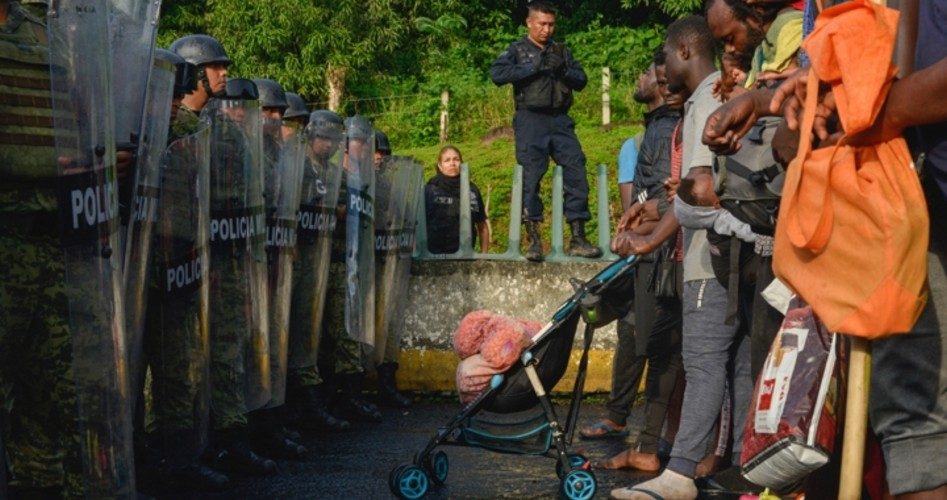
It appears that the 2,000 illegal aliens who piled up in Tapachula, Mexico, and hoped to caravan north to the United States aren’t going anywhere anytime soon.
The Mexican National Guard stopped yet another illegal-alien juggernaut, which included a number of Africans, after it left town to begin the long trip to the U.S. border
The illegals have been stuck in the border town for months because the Mexican government won’t issue travel visas they would use to traverse the country and jump the U.S. border in Texas or California.
The crackdown on illegals began shortly after President Trump threatened Mexico with tariffs as high as 25 percent if it didn’t stop the hordes from heading north.
That threat has apparently worked. In August, Customs and Border Protection reported, the number of illegals who crossed the U.S. border with Mexico was less than half of what it was in May, when it peaked at more than 140,000.
The Crackdown
The “migrants” moved out of town only to be rounded up and packed into buses and sent back to Tapachula, a city in the state of Chiapas, which borders Guatemala. Tapachula is about a 30-minute drive from the Suchiate River that forms part of the border between the two nations.
The journey to the border in Texas is anywhere from about 1,100 to more than 1,600 miles. The trip to Tijuana on the border with California is about 2,400 miles.
The “migrants” have been waiting in the city for weeks or months, AP reported.
“I want to pass through Mexico, I don’t want to live here,” a Honduran illegal told AP. He told AP he “had been living on the streets of Tapachula with his young children and wife, hoping for a transit visa from Mexican officials.”
“We’re at a standstill,” he lamented.
The AP reporter apparently didn’t ask why the illegal alien hasn’t returned home if he doesn’t like Mexico, but did, of course, cast a sinistral beam on the operation to stop the illegal caravan:
Men carried large, sagging backpacks while women carried children on their shoulders and parcels on their heads.
The group trudged about 24 miles (40 kilometers) northwest along a highway under the supervision of human rights officials before federal police and national guardsmen blocked their path.
An Associated Press photographer saw hundreds of men, women and children running to escape the security forces encircling them in Huixtla, Chiapas.
They were rounded up and placed in vans. Officials refused to say where they were transporting the migrants.
“This caravan no longer exists,” said migrant rights advocate Irineo Mujica, who was trying to help a migrant from the caravan locate a child.
Mujica, of course, isn’t a “migrant rights advocate.” He’s a full-time activist with Pueblo Sin Fronteras (Village Without Borders), the subversive open-borders outfit trying to erase the U.S. border with Mexico.
ABC’s video showed helmeted Mexican National Guardsmen moving forward with riot shields, and then Mexican authorities packing the illegals onto buses for the ride back to Tapachula.
Angry Africans
But Central Americans, again, aren’t the only “migrants” frustrated that Mexico won’t give them transit visas that would empower them to use Mexico as a stage to invade the United States.
“Hundreds of African migrants, in particular, have been stuck for months in Tapachula, where they say immigration authorities have stalled on giving them residency or transit papers,” AP reported. “Almost all of them want to seek asylum in the United States, rather than stay in Mexico.”
As VDare.com’s Allan Wall reported in September, the Africans have been making trouble since they began piling up in the city with no place to go. They actually fought with Mexican authorities and blocked the entrance to the local migration center, Wall reported, citing Mexican media. Cops even had to use tear gas to get the illegals under control.
A second report from Wall cited a story that said the Africans had, indeed, threatened a caravan north.
In July, The New American reported that some 35,000 Africans were heading here just as the World Health Organization declared that the Ebola virus outbreak in the Democratic Republic of Congo was a global emergency. As of July, the contagion had killed more than 1,700 people.
CBP has not posted the number of apprehensions for September, which closed fiscal 2019. As of August 31, CPB had apprehended 926,679 illegals either at ports of entry or after they jumped the border illegally.
Photo: AP Images



